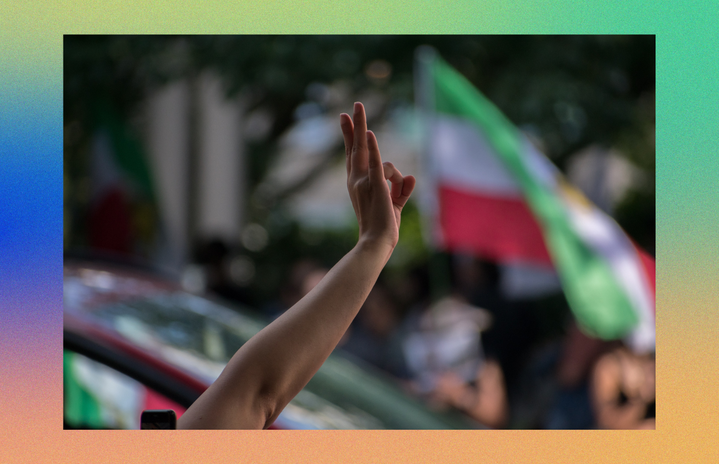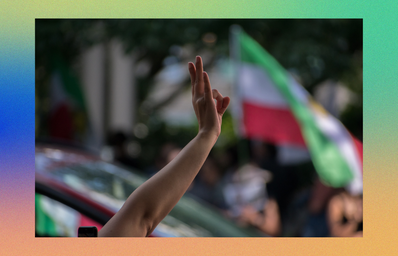Trigger warning: events discussed in this article are violent and may be disturbing to some readers.
Disclaimer: This article was last updated on 10/8/22. For more updates, visit Aljazeera.
Women and girls in Iran have been leading nationwide protests against the Islamic Republic of Iran following the death of 22-year-old Mahsa Amini.
Who was Mahsa Amini?
On Sept. 13, 2022 Mahsa Amini was detained by the morality police during a visit to Tehran, Iran’s capital, for not wearing a hijab correctly. Iranian law has required all women, not just Muslim women, to wear head coverings since 1979. Amini was in her brother’s car when she was arrested.
Three days later, Amini suddenly collapsed in police custody. She was taken to a hospital and died from what the police claim to be “a heart attack.” However, Iran International recently spoke to an anonymous source at the hospital Amini died in. The source said that when Amini was brought to the hospital, she was already brain dead and had suffered several blows to the head. On Oct. 7, an investigation found that Amini’s death was caused by “longstanding illness,” but Aljazeera, an independent Arabic news organization, reports that her family says she was perfectly healthy.
Why are women protesting?
Amini’s death has sparked outrage across Iran. Iranian women and girls have been leading demonstrations for almost four weeks now, protesting against the oppressive and violent regime. The head covering law has not only forced women to adhere to rules from a religion that they don’t follow, but it has given law enforcement opportunities to abuse and kill women. Just recently, students refused to attend the first day of the classes on Oct. 1 in the cities of Tehran, Tabriz and Shiraz. According to NBC News, students crowded campuses chanting “Women, life, freedom.” BBC World Service Lead Presenter and Iran specialist, Rana Rahimpour, posted a video on Twitter showing women in Sari dancing while burning their headscarves.
How is the government responding?
The Iranian government’s response to the protests has been violence and censorship. On Sept. 19, Iranians started experiencing curfew-like Internet outages everyday from 4 p.m. into the night. In Tehran, almost all social media services are censored or blocked, except for Twitter and Facebook. According to CNBC, Iranians have been using VPNs instead, services which can “encrypt and reroute their traffic to a remote server elsewhere in the world to conceal their online activity.”
How has this turned into a human rights crisis?
The Center for Human Rights in Iran reports that the Iranian government estimates that 1,200 arrests have been made since protests broke out on Sept. 16. However, the actual number is likely much higher. Young women at the frontlines of these protests have been injured and even killed at the hands of the police, as well.
Hadis Najafi, 22, was shot and killed by security while protesting in Karaj on Sept. 21. Sarina Esmailzadeh, 16, was killed when she was brutally beaten on her head with batons during a protest in Karaj on Sept. 23.
Another 16-year-old, Nika Shakarmi, went missing in Tehran on Sept. 20. She texted a friend saying that she was being chased by police. The next day, her aunt was shown on a television report saying, “Nika was killed falling from a building.” However, BBC Persian was told by a source that Shakarmi’s aunt and uncle were forced to talk about her death on TV after being threatened and interrogated by police. There are clips of her uncle speaking out against the protests with someone whispering to him, “Say it, you scumbag!”
How Is The U.S. Responding?
In response to violence from the Iraninan government, the Biden administration has issued new sanctions against Iran. Aljazeera reports that the sanctions are specifically against Ahmad Vahidi, interior minister, Eisa Zarepour, communications minister, Vahid Mohammad Nasar Majid, head of cyber-police and four other security officials. These sanctions are meant to block assets that these officials hold in the U.S. as well as restrict Iran’s global business and economy. The U.S. has also lifted some technology sanctions, allowing Iranian citizens to have better access to the Internet.
Iranian women have been leading a revolution. They refuse to be afraid or back down. They are making sacrifices and witnessing horrors that no one should have to experience. They stand strong.
Here are some ways to help these brave women.
Donate
Abdorrahman Boroumand Center monitors human rights violations and makes them public.
Center for Human Rights in Iran works with worldwide governments to advance human rights initiatives.
Fundraiser for Mainstream Media raises money to start marketing campaigns about the protests in Iran.
Call your Representatives
Urge them to ask President Biden to demand action from the United Nations. Ask for more Internet access for Iranians and for subscriptions to social media to be dropped. Voice your opinion for whether the Biden administration should negotiate nuclear deals with Iran. Ask your representatives to publicly support Iranian women’s rights.
Sign petitions
Amnesty International’s petition calls “on states to set up an independent UN mechanism now to investigate and ensure accountability for the most serious crimes under international law in Iran.”
Go to protests
The Middle East Matters Instagram account posts updates on events in Iran and shares protests in the U.S. that you can attend. If you can’t find one in your city, organize one yourself.
Follow Middle Eastern Activists
Masia Alinejad is Iraninan journalist and activist.
Gissou Nia is criminal and human rights lawyer, as well as the director of Atlantic Council Strategic Litigation Project.
Rana Rahimpour is the BBC World Service Lead Presenter and an Iran specialist.
Golshifteh Farahani is an Iranian actress.Christiane Amanpour is the CNN Chief International Anchor.


